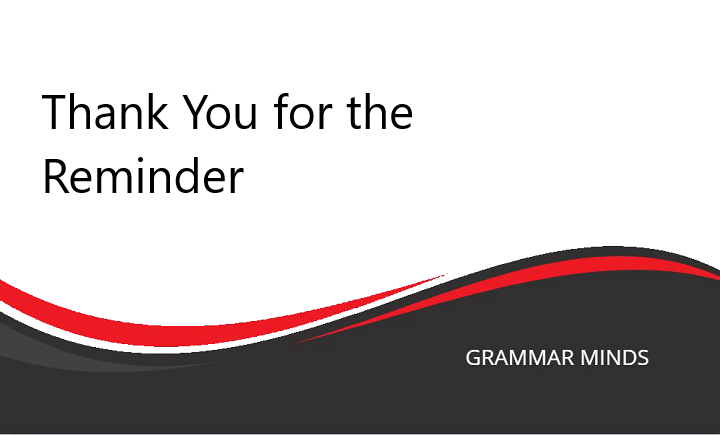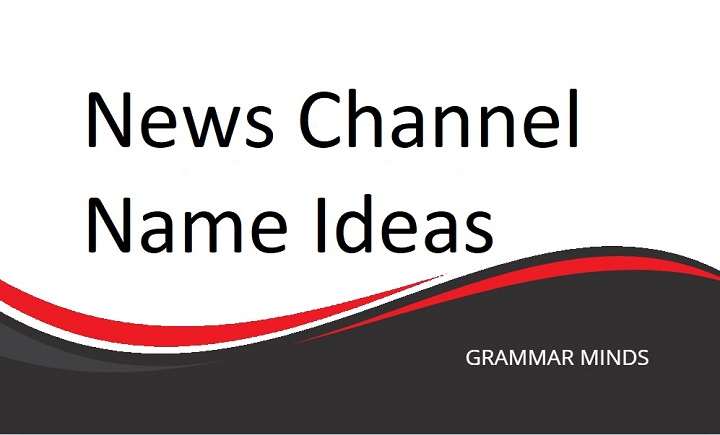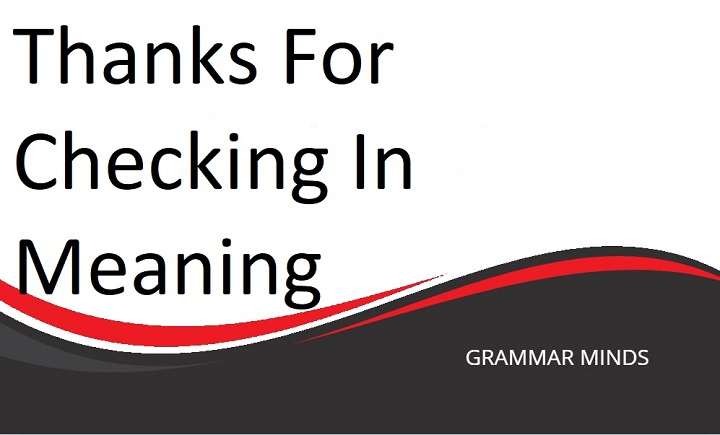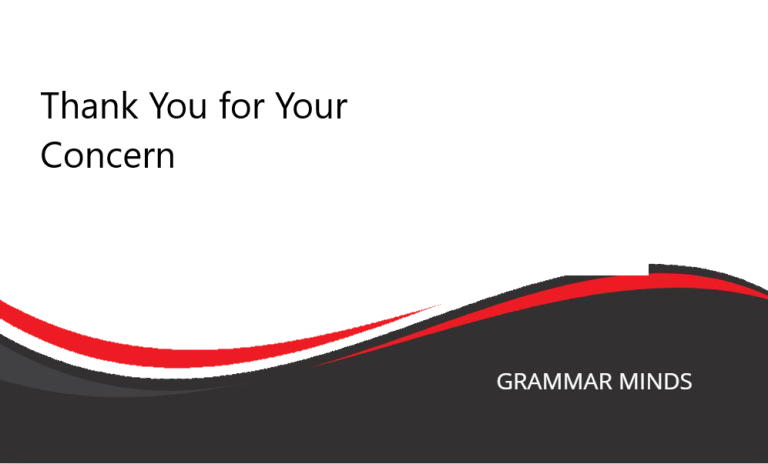“Thank you for the reminder” is a phrase we often find ourselves using in both personal and professional settings. Whether you’re replying to a colleague who has nudged you about a deadline or responding to a friend who reminded you about an important event, it’s a polite and effective way to acknowledge their prompt.
But do you find yourself using the phrase “thank you for the reminder” repeatedly? Have you grown tired of this repetitive expression when communicating in your professional or personal life?
Don’t worry! We’ve compiled a handy list of alternative phrases that you can use to mix things up and sound more varied in your conversations. Whether you’re crafting an email, sending a text, or having a conversation, these alternatives will help you keep your language fresh and engaging.
Other Ways to Say “Thank You for the Reminder”
I Appreciate the Heads-Up
This phrase conveys gratitude while sounding informal and conversational. It’s great for situations where you want to sound friendly yet polite.
Thanks for the Heads-Up
A casual alternative to “thank you for the reminder,” this phrase works well in informal conversations. It’s short and to the point, making it a great choice for quick messages.
Much Appreciated
This alternative works well in both casual and professional settings. It is polite, concise, and implies that the reminder was indeed helpful.
Thanks for Keeping Me on Track
This phrase expresses gratitude in a way that shows the reminder helped keep you focused. It’s particularly useful in work environments or situations where staying organized is important.
Grateful for the Reminder
This is a more formal option, perfect for emails or situations where you want to maintain professionalism. It conveys a deeper sense of gratitude.
Thanks for the Update
A practical phrase, especially when the reminder was part of an update or ongoing communication. It’s particularly effective in professional or team-oriented contexts.
You’re a Lifesaver
Ideal for informal settings, this phrase adds a bit of enthusiasm to your gratitude. It’s perfect for expressing how much the reminder meant to you, especially if it saved you from an inconvenient situation.
Good Looking Out
This is a casual, slightly slangy option. It’s perfect for informal settings where you want to express gratitude to someone in a relaxed and friendly manner.
I Won’t Forget Again, Thanks!
This phrase shows acknowledgment that you needed the reminder and adds a bit of self-awareness or humor. It’s a great way to show appreciation while keeping the tone light.
Thanks for the Nudge
A friendly and casual way to acknowledge someone’s reminder, “thanks for the nudge” implies that their prompt was just the push you needed.
Key Notes
“Thank you for the reminder” is grammatically correct and suitable for both formal and informal situations. However, it can sometimes feel a bit basic, especially if you find yourself using it frequently.
- “I Appreciate the Heads-Up” is a versatile phrase suitable for both formal and informal situations, especially in emails or conversations that require a polite tone.
- “Thanks for the Heads-Up” is a great informal alternative to “thank you for the reminder” for casual settings.
Keep reading to discover how to use these phrases in both formal and informal situations, and see real-life examples of how they can be applied.
I Appreciate the Heads-Up
Usage:
If you’re looking for a more formal way to say “thank you for the reminder,” try using “I appreciate the heads-up.” This alternative adds a touch of sophistication, making it ideal for professional environments such as emails or meetings.
Example (in an email):
Dear Sarah,
Thank you for your assistance with the upcoming project. I appreciate your efforts and look forward to your response.
I appreciate the heads-up regarding the meeting date.
Best regards,
John
Thanks for the Heads-Up
Usage:
A more informal alternative to “thank you for the reminder” is “thanks for the heads-up.” This phrase works well in conversations where you are speaking to people you are already familiar with, such as friends or family.
Example (in conversation):
Hey Mike,
Thanks for the heads-up about tomorrow’s meeting. I’ll make sure to be prepared.
Catch you later!
Much Appreciated
Usage:
“Much appreciated” works perfectly in both professional and casual contexts. It’s polite, concise, and ideal for messages where you need to acknowledge the reminder without being overly formal.
Example (in an email):
Hi Alex,
Thanks for sending over the updated documents. Much appreciated!
Best,
Laura
Thanks for Keeping Me on Track
Usage:
This phrase is especially useful in situations where the reminder helped you stay organized or focused. It’s a bit more specific than the other options, making it ideal for work-related conversations.
Example (in a meeting):
I really appreciate the reminder, Jessica. Thanks for keeping me on track with those deadlines!
Grateful for the Reminder
Usage:
This is a more formal option that conveys sincere gratitude. It’s great for emails or other professional settings where you want to express a deeper level of appreciation.
Example (in an email):
Dear Mr. Johnson,
Thank you for the reminder about our upcoming meeting. I am grateful for the reminder, as I might have missed the notification otherwise.
Sincerely,
Rebecca
Thanks for the Update
Usage:
“Thanks for the update” is a practical phrase, particularly when the reminder was part of an ongoing conversation or situation. It works well in both professional and casual contexts.
Example (in an email):
Hi Emily,
Thanks for the update on the report. I’ll make sure to review it before the end of the day.
Best regards,
Tom
You’re a Lifesaver
Usage:
This is a highly informal phrase used to express a strong sense of gratitude. It’s great for moments when the reminder really helped you out of a tricky situation.
Example (in conversation):
Thanks for reminding me about that deadline! You’re a lifesaver!
Good Looking Out
Usage:
“Good looking out” is a casual, almost slang-like phrase that’s best used in informal settings, particularly among friends or close colleagues.
Example (in conversation):
Good looking out on the project update, Josh. I would have totally missed that deadline!
I Won’t Forget Again, Thanks!
Usage:
This phrase is perfect when you want to add a bit of humor or self-awareness to your response. It shows that you’re grateful for the reminder and recognizes that you had forgotten something important.
Example (in conversation):
Oops, I nearly forgot to send that report. I won’t forget again, thanks for reminding me!
Thanks for the Nudge
Usage:
“Thanks for the nudge” is a relaxed and informal way to thank someone for a reminder. It’s great for casual conversations where you want to keep the tone friendly and light.
Example (in conversation):
Hey Sam,
Thanks for the nudge earlier. I’ve sent over the files!
Is It Correct to Say “Thank You for the Reminder”?
Yes! “Thank you for the reminder” is grammatically correct and suitable for both formal and informal settings. It’s a versatile phrase that can be used in professional emails, conversations with colleagues, or casual chats with friends.
That being said, using synonyms like the ones we’ve listed above will help you mix up your language and sound more varied in your communication.
You can also try slight variations of this phrase, like the following:
- “Thank you for your timely reminder.”
- “I appreciate the reminder.”
- “Thanks for reminding me!”
Also Read:
Top 10 Ways to Say “Have a Great Vacation”
In conclusion, “thank you for the reminder” is a perfectly acceptable and grammatically correct phrase, whether you’re using it in a formal or informal setting. However, the alternative phrases provided in this article will help you diversify your vocabulary and communicate more effectively in different contexts. By using these alternatives, you’ll keep your language fresh, engaging, and tailored to your audience.







